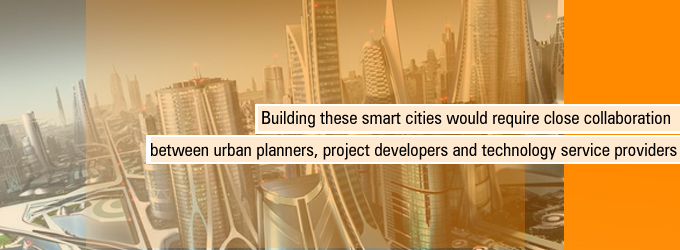|
Prime Minister, Narendra Modi’s vision of building 100 smart cities, is expected to change the urban landscape of India significantly. However, to turn this vision into ground reality, the central government has to sell this idea effectively to state governments and private developers.

The Bharatiya Janata Party’s election manifesto has promised to build 100 smart cities enabled with the latest technology and infrastructure. The cause got a big push when Finance Minister, Arun Jaitley, allocated a sum of Rs 7,060 crore for the development of these cities in the Union Budget 2014-15. The cities will be developed as satellite towns of larger cities, and by modernising the existing mid-sized cities. Conditions set for foreign direct investment (FDI) were also relaxed to help in the creation of greenfield satellite cities.
What is a smart city?
Even though there is no set definition for it, a smart city broadly means a city which uses high-end information and communication technologies, to deliver better services and improve the overall living conditions of its residents. Power, water and other utilities are monitored and managed for efficient usage. It is equipped with smart solutions to commuting, automated security and surveillance systems and wi-fi powered open spaces.
The basic reason behind building smart cities is that the existing urban systems cannot cope with new challenges thrown by an ever increasing population which demands better living standards. The idea involves upgrading existing cities or building new satellite towns or greenfield cities in and around the major cities.
The concept itself is not new in India. The Delhi-Mumbai Industrial Corridor (DMIC) project aims to develop 24 industrial regions as ‘Smart Cities’. Several real estate developers have also incorporated hi-tech features into their upcoming projects, like the Lodha Group’s Palava city project in Mumbai, and Kumar Urban Development’s KUL Ecoloch’ township project in Pune. As for the proposed 100 smart citites, it has not been specified yet as to when and where they will be built.
Further, planners of the Smart Cities have to look into the following points before taking up implementation of one of NDA’s most ambitious projects.
Firstly, the fund requirements: The sum of Rs 70 crore, allocated in the current year’s budget, is grossly inadequate for such an ambitious project. It can be considered as seed capital to kick-start the project, but full fledged implementation would require huge capital investment. A major share of the planned projex will have to come from private investors and abroad.
Secondly, the state governments are going to play a key role in the development of Smart cities as land is a state subject, and the project will require identification and procurement of land for development of infrastructure. The states’ positive involvement is required for increased private participation.
And thirdly, smart cities require integration of various systems covering both, physical and digital infrastructure. That would be possible only with close collaborations between urban planners, project developers and technology service providers. This calls for setting up of a mechanism to ensure seamless cooperation between the three segments.
On the brighter side, the smart city concept has already enthused several state governments including Kerala, Telangana and West Bengal. The Telangana state industrial infrastructure corporation (TSIIC) recently launched a five-point campaign towards smart cities. West Bengal is also planning to develop three smart cities at Raghunathpur, Sagar and Jaigaon. Such initiatives from the states, along with relaxations in land acquisition rules will help the programme in a big way.
While drawing up plans for setting up Smart cities, the government should focus more on setting up greenfield cities rather than upgrading the existing cities into smart cities as the later plans will call for more structural changes and increased investment.
|